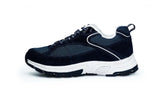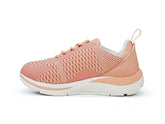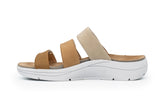WHY YOUR SHOES MIGHT BE WORSENING KNEE OR HIP PAIN
Knee and hip pain are among the most common musculoskeletal complaints, often making simple daily tasks such as walking, climbing stairs, or standing for extended periods difficult. The causes of knee and hip pain can vary from arthritis and injury to muscle imbalances, but one factor that is often overlooked and yet can contribute greatly to this discomfort is your footwear.
Shoes play an essential role in supporting how aligned your body is. The way your feet are placed determines the rest of your posture, and improper footwear can easily throw your lower half's balance and alignment out of whack. The wrong shoes for your specific needs can rapidly exacerbate knee and hip pain, even progressing to more severe complications down the road.
We are going to talk about how wrong shoes can aggravate knee and hip pain, as well as some tips on choosing the right shoes that could alleviate the said issues.

Lack of arch support
One of the primary roles of shoes is to provide adequate arch support, helping to maintain proper alignment from the feet up through the knees and hips. Without proper arch support in shoes, your feet may become misaligned, causing the entire lower body to shift out of its natural position.
This often includes overpronation (a tendency for the feet to roll inward), brought on by worn-out flat shoes or those not designed to allow arch support; pressure increases up to the knee level. More pressure on this unnatural alignment pushes additional stress around the hip and muscles that act upon it. Such conditions make some of the individuals involved experience pain while still being a significant contributor to a more chronic, developing condition—patellofemoral pain syndrome and hip osteoarthritis.
On the contrary, shoes that are too arch-supportive, like stiff shoes or high heels, make the feet raise too high, which causes bad posture and hurts the knees and hips. A person should find a shoe with a balanced level of arch support so that they can align their feet properly and, consequently, spread out their body weight evenly.
Wearing high heels and foot angles
Wearing high heels is a common cause of knee and hip pain. High heels shift the body's weight forward, causing the ankles, knees, and hips to align unnaturally. The forward tilt that high heels create forces the knee joints to overextend and places more pressure on the hips, which can lead to misalignment and pain.
The heel also elevates the person, which alters the mechanics of walking. This causes additional stress on the knee joints, especially in those who already have joint problems, such as arthritis or general wear and tear. The unnatural posture of high heels can exacerbate existing knee or hip pain, and in some cases, contribute to the premature onset of these conditions in those who regularly wear heels.
High heels can also affect your walking gait, making you take shorter steps or lean forward more, which increases pressure on the knees and hips. Over time, these poor gait mechanics can contribute to muscle imbalances, which worsen the pain.
Improper fit
Poorly fitting shoes may lead to misalignment, exacerbating knee and hip pain. For instance, shoes that are too tight or too loose may make the toes press against the shoes tightly, causing stiffness in the feet or misalignment of the feet. In such cases, the body has to adjust posture to ensure movement of the feet inside the shoes, leading to misalignment of the knees and hips.
Shoes that are too loose make a foot unstable. It would be like if your foot is sliding inside your shoe because then, in addition to its work, muscles and ligaments would need to provide an additional stabilizing effect. The excess effort might bring on muscle fatigue and then also strain the knees and hips.
Shoes are an essential item that should fit the feet to help maintain proper posture and keep your feet, knees, and hips aligned. In order not to have any problems, the right shoes are those that give a snug fit but are not tight. The width of the shoes also matters since too narrow or too wide can cause additional foot problems, causing pain in the knees and hips.
Flat shoes or lack of arch support
Flat shoes may look comfortable, but generally, arch support is practically nothing. The improper support of your feet makes them drop down and hence into overpronation. Ultimately, this can mean greater stress on your knees and hips.
If your arch is not in place, you must use either an inward-turning or an outward-turning motion in the knees to correct balance. Again, this causes you undue stress, leading to more discomfort and potentially more problems within the joint itself and up to your hip. Individuals who suffer from flat feet and a history of knee or hip discomfort need arch support to stabilize the feet to an acceptable standard.
Your shoes have a profound impact on the health of your knees and hips. Poorly designed, ill-fitting, or cushionless footwear can cause alignment problems, leading to pain and discomfort in the knees and hips. On the other hand, proper arch support, cushioning, flexibility, and a good fit can help alleviate existing pain and prevent further complications.
Sometimes, a change as simple as being in your shoes makes all the difference. If you have knee or hip pain, take a look at your shoes. Shoes can support the natural alignment of the body and decrease the stress placed on your joints, improving your posture and enabling you to continue being active without pain.
Take the Next Step Towards Comfort and Care
Discover the perfect balance of support, style, and expert guidance for your feet. Explore our collection of orthopedic and diabetic shoes designed to keep you moving with ease.
Start your journey to happy, healthy feet today!
Visit us at DiabeticShoe for more tips, insights, and footwear solutions.
Stay Connected:
Follow us on Facebook, Instagram, YouTube, LinkedIn, Twitter, Pinterest, and Quora for updates, advice, and more informative content.








